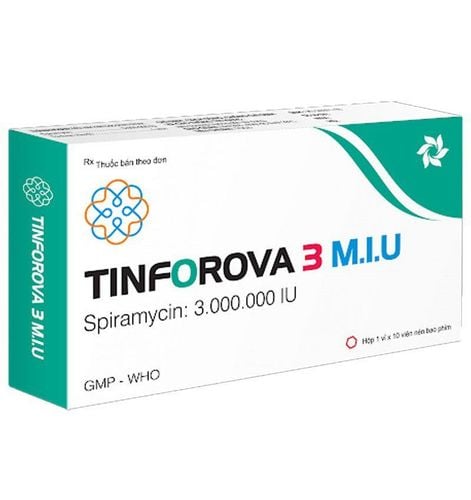This is an automatically translated article.
Meyerifa belongs to the group of antiparasitic, anti-infective, antiviral and antifungal drugs. The drug is made in the form of tablets, the main ingredient is Rifampicin. Meyerifa is indicated in the treatment of tuberculosis, prevention and infection. However, during treatment with Meyerifa, patients may experience side effects such as digestive disorders, itching, rash...
1. What is the effect of Meyerifa?
The main ingredient of Meyerifa is Rifampicin - a synthetic antibiotic from natural antibiotics, obtained in the culture of streptomyces mediterranean, with weak antibiotic activity.
Meyerifa has a bactericidal effect. The minimum inhibitory concentration for TB bacilli is 0.1 to 2 micrograms/ml. The drug has a broad antibiotic spectrum, works well against gram-positive and gram-negative bacteria such as gonococcal, meningococcal, streptococci, including methicillin-resistant strains, and Haemophilus influenzae. The mechanism of action of the drug Meyerifa is attached to the beta unit of RNA-polymerase, which will then distort the information system of this enzyme, causing inhibition of the initiation of new RNA synthesis. In humans, the enzyme RNA-polymerase with drugs should be slightly toxic, unless used in high doses.
Bacteria are resistant to rifampicin due to a structural change in the beta subunit of the enzyme RNA-polymerase. However, the resistance of TB bacteria to rifampicin is generally lower than that of other bacteria. Therefore, Rifampicin should be used exclusively for the treatment of tuberculosis infections and severe infections caused by bacteria susceptible to or resistant to Meyerifa.
Meyerifa is quite well absorbed from the gastrointestinal tract and has an availability of up to 90%. After taking 2 to 4 hours, Meyerifa reaches a maximum concentration in the blood of 7 to 9 micrograms/ml. However, food can slow down and reduce the absorption of the drug.
Meyerifa is metabolized in the liver and eliminated through feces, urine, sweat, saliva, tears...
2. Indications and contraindications of the drug Meyerifa
Meyerifa is indicated for the treatment of all forms of tuberculosis, including meningitis and leprosy. In addition, the drug is also used in meningitis caused by Haemophilus influenzae and Neisseria meningitidis. Meyerifa is also used in the treatment of severe infections caused by staphylococcus species, including strains that are resistant to methicillin.
However, Meyerifa is contraindicated in cases of hypersensitivity to the components of the drug.
3. Dosage and how to use Meyerifa
Meyerifa is used orally. In the treatment of tuberculosis, adults are recommended to use Meyerifa at a dose of 8 to 12gmg/kg and used once a day. For children, use Meyerifa at a dose of 10m/kg and use it once a day. When used in combination with other anti-tuberculosis drugs, Meyerifa should be used as prescribed by a doctor. Treatment of serious diseases caused by gram-positive and gram-negative bacteria, for infants, will use Meyerifa at a dose of 15 - 20mg/kg/day and divided into 2 times. For adults, the dose of Meyerifa is 20-30mg/kg/day and divided into 2 times. In the prevention of meningococcal meningitis, use Meyerifa for adults with a dose of 600mg / time, each time 12 hours apart. For children from 1 year to 12 years old, Meyerifa is used at a dose of 10mg / kg, each time taking 12 hours apart. For children under 1 year of age, use Meyerifa at a dose of 5mg/kg, 12 hours apart each time. Use Meyerifa in the treatment of leprosy at a dose of 600mg/time/month. Meyerifa is combined with other medicines as directed by your doctor. Note: The recommended dose of Meyerifa above is for reference only. Therefore, before using Meyerifa, patients need to follow the doctor's instructions.
4. Treatment of drug overdose Meyerifa
If you miss a dose of Meyerifa, use it as soon as you remember. However, if the interval between the missed dose of Meyerifa and the next dose is too close, skip the missed dose. Patients should not use a double dose of Meyerifa, because it can cause an overdose. To overcome the situation of missing a dose of Meyerifa, patients can set an alarm or ask their loved ones to remind them. In case of accidentally using Meyerifa drug in excess of prescribed and showing some unwanted signs, it is necessary to take the patient to the emergency room immediately.
5. Side effects when using Meyerifa
Meyerifa may cause some unwanted side effects during treatment. However, with each case, the side effects of Meyerifa can occur in varying degrees from mild to severe.
Some common side effects caused by Meyerifa include: Facial flushing, itching, rash, hypersensitivity reactions, loss of appetite, nausea, bloating, diarrhea, cold fever, tremor, headache, dizziness , bone pain ... These side effects may occur at the beginning of treatment or after increasing the dose of Meyerifa. Usually, side effects from Meyerifa can be transient or subside over time.
However, in some cases Meyerifa can cause serious unwanted side effects with rare reactions. These reactions may appear within minutes of using Meyerifa or longer within a few days. When serious side effects appear, such as: pseudomembranous colitis, hepatotoxicity and hypersensitivity, increased blood transaminases, cerebral hemorrhage, eosinophilia, leukopenia, edema, asthmatic respiratory disorders , hypotension, acute hemolytic anemia, reversible acute asthenia, menstrual disorders, etc., the patient should stop using Meyerifa and go to a medical facility for immediate medical assistance. instantly.
Some notes during the use of Meyerifa include:
For women who are pregnant and breastfeeding, they should be cautious when using Meyerifa and if possible, they should avoid using this drug. Patients should be advised to use Meyerifa from their doctor, and carefully analyze the benefits and risks before using the drug. Meyerifa may change how well it works and increase the side effects of other medicines. Therefore, in order to avoid drug interactions, Meyerifa patients should provide their doctor with a list of previously used drugs, including prescription and non-prescription drugs, herbs,... Note the manifestations of allergy to the drug. Patients should report their reactions to their doctor so that they can be treated promptly. Meyerifa medicine can make patients feel dizzy, headache. Therefore, people who operate machinery or drive vehicles should pay attention when using the drug to ensure safety. Meyerifa drugs should be used with caution when used with calcium blockers, antiarrhythmics, anticoagulants, antifungals... Above is all information about Meyerifa drugs, patients need to carefully read the instructions for use, consult with them. by your doctor/pharmacist before use. Note, Meyerifa is a prescription drug, so patients absolutely cannot buy and treat it at home because they may experience unwanted side effects.













